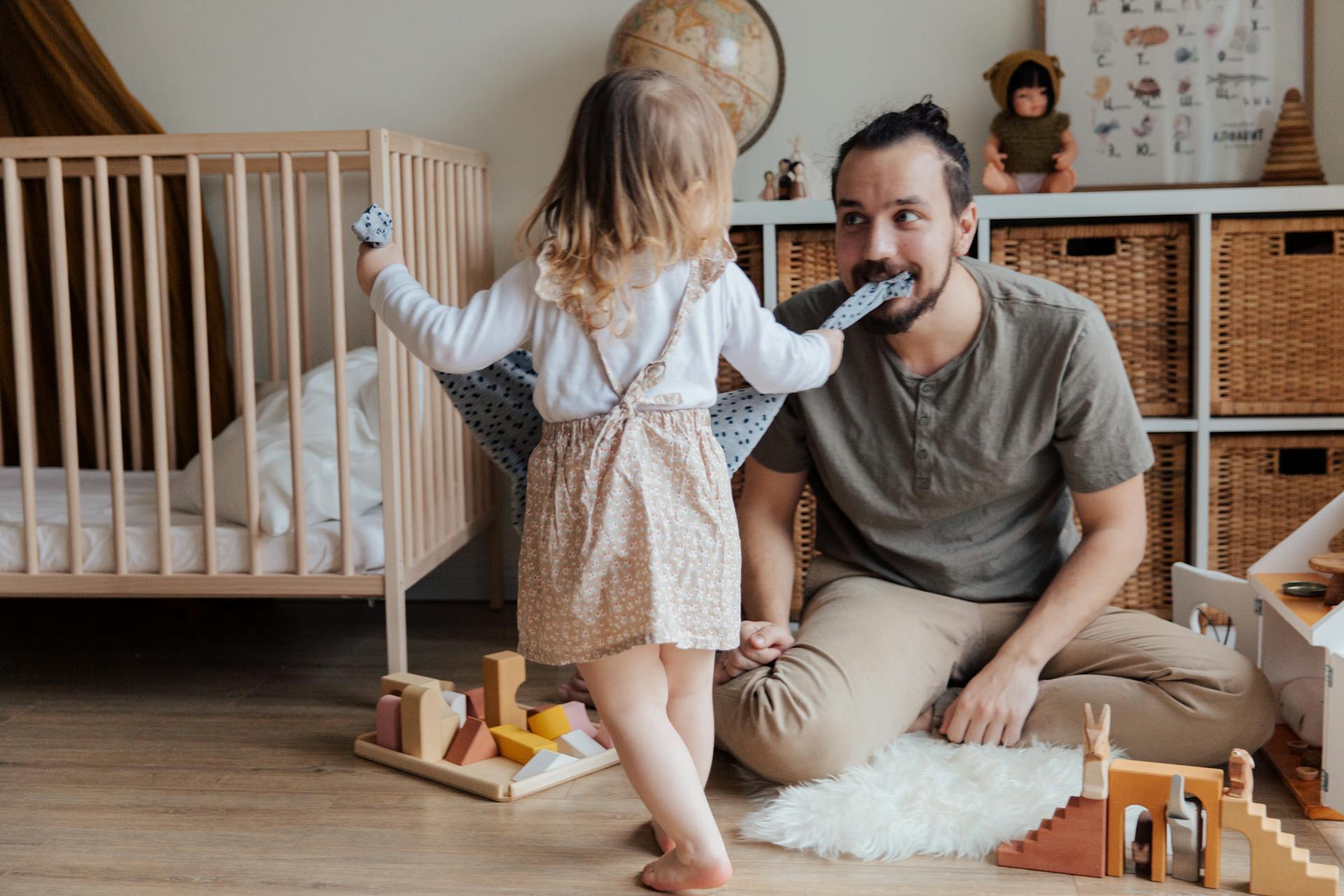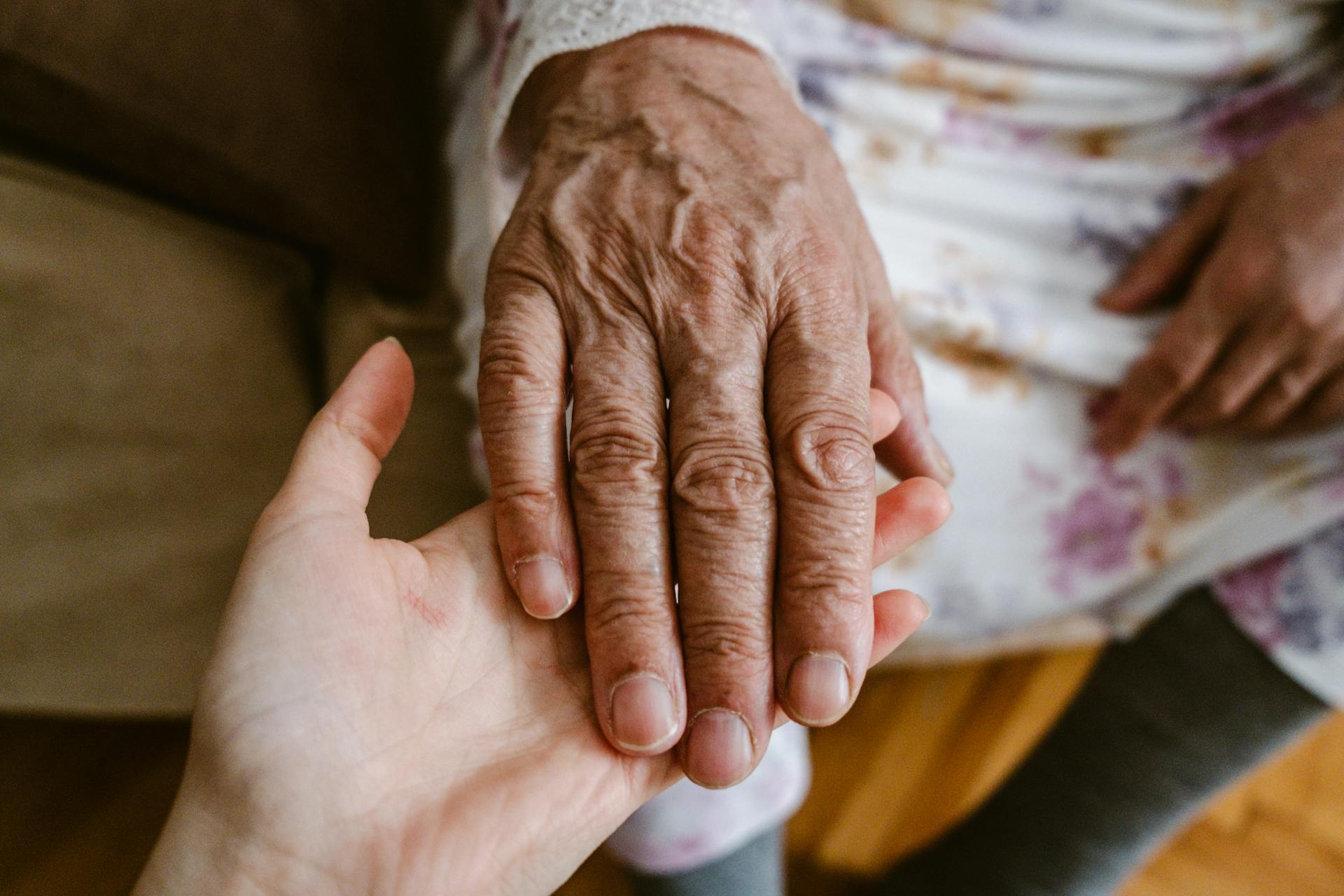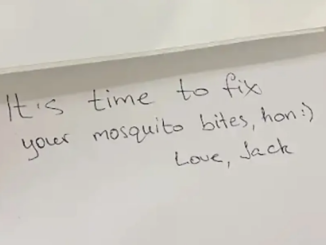
The antique clock in the hallway chimed six times, its resonant tones echoing through the quiet house. I knelt on the living room carpet, building a precarious tower of blocks with Lucas, my five-year-old stepson. He giggled, his small hands clumsily placing a wobbly blue block atop the structure.
“Careful, Lucas,” I cautioned, “it’s going to fall!”
He squealed with delight as the tower swayed, then crashed to the ground. But his laughter died abruptly, replaced by a wide-eyed stare directed towards the hallway.
“Mom says you shouldn’t touch her things,” he whispered, his voice barely audible.
A shiver ran down my spine. “What do you mean, sweetie?” I asked, my voice trembling slightly.
He pointed towards the hallway, his eyes fixed on something I couldn’t see. “Mom says she doesn’t like it when you move her picture.”
My heart pounded in my chest. “Lucas,” I said, forcing a smile, “your mom… she’s not here anymore, remember?”
He shook his head, his expression serious. “No, she is. She’s right there.”
I followed his gaze, my eyes scanning the empty hallway. There was nothing there, just the familiar antique furniture and the framed photographs on the wall. Yet, Lucas’s words echoed in my mind, fueling a growing unease that had been plaguing me for weeks.
It had started with a simple whisper, a chilling confession as I tucked him into bed one night. “My real mom still lives here,” he had said, his voice barely a breath.
I had dismissed it as a child’s overactive imagination, a way of coping with the loss of his mother. But then, strange things started happening. Lucas’s toys, meticulously tidied away, would reappear in the middle of the living room floor. Kitchen cabinets, carefully organized, would be found rearranged overnight. And the photograph of Ben’s late wife, Mary, which I had moved to a less prominent spot, kept returning to its original place on the mantelpiece, perfectly dusted.
I had tried to rationalize it, to attribute it to forgetfulness or coincidence. But the incidents grew more frequent, more unsettling. And Ben, my husband, seemed oblivious, or perhaps, deliberately blind to it all.
“Ben,” I had said one evening, my voice trembling, “have you noticed anything… strange happening around the house?”
He had looked at me, his brow furrowed. “Strange? Like what?”
I hesitated, unsure how to articulate the growing sense of unease that had taken root in my heart. “I don’t know… things moving, things changing…”
He had chuckled, dismissing my concerns with a wave of his hand. “You’re just tired, darling. It’s been a stressful few weeks.”
But I wasn’t tired. I was terrified.
Now, as I looked at Lucas, his eyes wide with conviction, I knew I couldn’t ignore it any longer. Something was happening in this house, something I couldn’t explain.
“Lucas,” I said, my voice gentle, “can you tell me more about your mom? What does she look like?”
He tilted his head, his brow furrowed in thought. “She’s very pretty,” he said. “She has long hair, like you. And she wears a white dress.”
My blood ran cold. The description matched the woman in the photograph, the woman whose presence seemed to linger in every corner of this house.
“And what does she say to you?” I asked, my voice barely a whisper.
Lucas looked at me, his eyes filled with a chilling seriousness. “She says she’s not happy,” he whispered. “She says you’re trying to take her place.”
A wave of fear washed over me, so intense it almost brought me to my knees. I looked around the room, the familiar furniture suddenly seeming menacing, the shadows deepening in the corners. I felt a presence, a cold, unseen gaze fixed upon me.
I had married a widower, a man I loved deeply, a man who had welcomed me into his life and his home. But I had also married into a house haunted by the past, a house where the presence of his late wife lingered, a house where I was not welcome.
Ouvi uma jovem na rua cantando a mesma música que minha filha cantava antes de desaparecer há 17 anos, então me aproximei

Eu estava caminhando para casa do trabalho um dia, pensando nas contas que eu tinha que pagar naquela noite. Mas quando virei a esquina para a rua da praça da cidade, uma melodia familiar de repente chegou aos meus ouvidos e me fez parar no meio do caminho.
Era a música que eu costumava cantar com minha filha Lily antes dela desaparecer de nossas vidas há 17 anos.
Era uma música que eu tinha feito só para ela, uma pequena canção de ninar sobre um campo de flores e luz do sol que iluminaria seus sonhos. Ninguém mais saberia disso. Ninguém.

Um homem com sua filha | Fonte: Pexels
Mas aqui estava, claro como o dia, cantado por uma jovem mulher parada do outro lado da praça, olhos fechados, com um sorriso sereno.
A música me lembrou de quando nossa garotinha enchia nossa casa com calor e alegria. Ela era o centro do nosso mundo, e seu desaparecimento repentino deixou um buraco enorme em nossas vidas que nunca se curou completamente.
De repente, todas as preocupações desapareceram da minha mente naquele dia, e senti minhas pernas me carregando para frente como se eu não tivesse controle.

Um homem em pé ao ar livre | Fonte: Midjourney
Minha mente continuava dizendo que era impossível, que não poderia ser, mas meu coração me empurrou para frente.
A mulher parecia familiar, dolorosamente familiar. Cabelos escuros caíam em ondas suaves ao redor do rosto, e olhar para o sorriso dela me fez pensar que eu já o tinha visto mil vezes em fotos antigas e em minhas próprias memórias.
Ela até tinha uma covinha na bochecha esquerda, assim como Cynthia, minha esposa.
Tudo parecia incrível demais, muito para acreditar, mas havia essa atração. Um sentimento que só um pai poderia conhecer.
Será que essa pode ser minha Lily?

Uma mulher cantando uma música | Fonte: Midjourney
Fiquei tão nervoso quando me aproximei. Observei enquanto ela terminava a música e abria os olhos. Ela me pegou olhando, mas desviou o olhar enquanto a multidão a aplaudia.
Obrigada a todos por ouvirem! ela disse com um largo sorriso. “Tenham um ótimo dia!”
Então, seu olhar encontrou o meu, e ela notou a expressão estranha no meu rosto.
“Parece que você não gostou da minha performance”, ela disse, caminhando até lá. “Eu fui tão ruim assim?”
“Oh, não, não”, eu ri. “Eu, uh, essa música é especial para mim. É muito especial.”

Um homem conversando com uma garota | Fonte: Midjourney
“Ah, é mesmo?”, ela perguntou. “É superespecial para mim também. Veja bem, é uma das poucas memórias da minha infância. Eu canto desde que me lembro. É a única coisa que me resta daquela época.”
Parecia que ela estava prestes a ir embora, então eu perguntei abruptamente: “O que você quer dizer com isso?”
“É uma longa história”, ela respondeu enquanto olhava para o relógio. “Talvez em outra hora.”

Uma jovem mulher olhando para longe enquanto fala com um homem | Fonte: Midjourney
“Por favor, eu gostaria de ouvir”, eu insisti, meu coração batendo forte. “Eu te pago um café e podemos conversar, se você não se importar.”
Ela fez uma pausa, me estudando por um segundo, então assentiu. “Bem… claro, por que não?”
Caminhamos até o café e nos acomodamos em uma mesa de canto. Quanto mais eu olhava para ela, mais familiar ela parecia. Seus olhos, seu sorriso e até mesmo sua voz pareciam um lar.
Parecia que uma peça que faltava na minha vida tinha de repente se encaixado.

Um homem sentado em um café | Fonte: Midjourney
“Você tem uma voz linda”, eu disse, tentando manter a compostura.
“Obrigada”, ela sorriu. “Na verdade, eu estava apenas passando pela cidade a trabalho quando ouvi aquela banda tocando. Eles estavam perguntando se alguém queria cantar, e bem, eu simplesmente tive que fazer isso.”
“Essa música… onde você a aprendeu?”, perguntei.

Um homem conversando com uma mulher mais jovem | Fonte: Midjourney
Ela suspirou, olhando para o café. “Eu não ‘aprendi’ exatamente. É só que… é a única coisa que eu lembro da minha infância. Eu costumava cantar, ou cantarolar, o tempo todo. Meus pais adotivos disseram que era como meu próprio hino.”
“Pais adotivos?”, perguntei, mal conseguindo manter a voz firme.
Ela assentiu.

Uma garota sentada em um café | Fonte: Midjourney
“Sim. Eu fui… acolhida por uma família quando eu tinha cinco anos. Eles me disseram que meus pais verdadeiros morreram em um acidente de carro. Eles até me mostraram fotos do jornal,” seu rosto suavizou, os olhos marejados.
“Eles foram gentis comigo, me deram brinquedos e me trataram bem. Mas eu sempre senti falta dos meus pais verdadeiros. Com o tempo, comecei a acreditar que meus pais adotivos eram a única família. Mas conforme fui crescendo, tive essa sensação incômoda de que estava faltando alguma coisa, que talvez eles não estivessem me contando toda a verdade.”

Uma adolescente em pé ao ar livre | Fonte: Pexels
Eu podia sentir minhas mãos tremendo.
“E… você chegou a descobrir a verdade?”, perguntei cuidadosamente.
“Eu tentei”, ela disse. “Veja bem, quando fiquei mais velha, meus pais adotivos tentaram tornar isso oficial. Eles queriam me adotar legalmente. Eles me disseram que eu deveria dizer que queria ficar com eles. Então, eu fiz.”

Uma mulher conversando com um homem mais velho | Fonte: Midjourney
“Mas quando fiz 18 anos”, ela continuou. “Comecei a questionar tudo. Tentei encontrar meus pais verdadeiros, mas acho que não tinha informações suficientes. Tentei entrar em contato com qualquer pessoa que pudesse ter me conhecido antes, mas meus registros não correspondiam a nenhuma criança desaparecida. Eu tinha tão poucos detalhes para prosseguir.”
Ela fez uma pausa, olhando para suas mãos. “É só essa música que eu tenho agora. Ela me lembra delas.”
As peças estavam começando a se encaixar.

Um homem olhando para uma mulher | Fonte: Midjourney
Uma parte de mim queria pedir um teste de DNA ali mesmo para confirmar o que meu coração já sabia, mas outra parte estava com medo demais para acreditar.
“Você se lembra de mais alguma coisa sobre seus pais verdadeiros? Além dessa música?”, perguntei.
“Está tudo tão embaçado. Lembro-me de ser feliz, no entanto, antes de tudo mudar. Acho que meu nome era Lily?” Ela riu nervosamente. “Mas não tenho certeza. Meus pais adotivos me chamavam de Suzy, e depois de um tempo, era só a isso que eu respondia.
Eu não conseguia acreditar nas palavras dela.

Um homem preocupado | Fonte: Midjourney
“M-minha filha”, gaguejei. “O nome dela também era Lily.”
Ela levantou a cabeça bruscamente. “Você está falando sério?”
Eu assenti, lutando contra as lágrimas. “Ela desapareceu quando tinha cinco anos, e isso foi há 17 anos. Nunca encontramos respostas. Mas nunca paramos de ter esperança. O nome da minha esposa é Cynthia, a propósito.”
Ela engasgou e arregalou os olhos.
“O nome da minha… da minha mãe também era Cynthia”, ela sussurrou. “Eu me lembro claramente porque ela sempre me fazia dizer o nome dela e do meu pai. Você é… você é John?”

Uma jovem mulher | Fonte: Midjourney
“Sim”, segurei a mão dela. “Eu sou John.”
Nós apenas sentamos lá por um momento, olhando um para o outro em silêncio atordoado. E então, como uma represa se rompendo, as lágrimas vieram. Nós nos abraçamos, ambos chorando enquanto anos de saudade, confusão e tristeza nos inundavam.
Era como se todos os anos perdidos, as noites intermináveis de questionamentos, finalmente encontrassem uma resposta.
“Pai?” ela sussurrou, com a voz trêmula.
“Sim, Lily,” consegui dizer, minha voz embargada. “Sou eu… somos nós.”

Um homem olhando para frente | Fonte: Midjourney
Depois de um tempo, perguntei a Lily se ela gostaria de conhecer sua mãe.
Minhas mãos tremiam quando chamei um táxi quando ela concordou em me seguir para casa.
Não conversamos muito durante a viagem para casa. Eu só fiquei me perguntando como tudo isso estava acontecendo. Era bom demais para ser verdade.
Quando chegamos, pedi para Lily esperar na porta porque eu sabia que Cynthia precisaria de um momento para processar tudo. No entanto, ela sabia que algo estava errado no momento em que entrei.

Uma mulher sentada em sua sala de estar | Fonte: Midjourney
“O que aconteceu?” ela perguntou. “Você está bem?”
“Cynthia, tem uma coisa que preciso te contar”, eu disse, tocando seus ombros.
Então contei a ela tudo o que aconteceu nas últimas horas.
“Oh Deus, oh Deus”, ela disse em lágrimas. “Não, não. Não pode ser. Isso é impossível, John!”
Segurei suas mãos e tentei acalmá-la.
“É verdade, Cynthia. Nossa Lily está de volta”, sorri.
“Onde ela está? Onde está nossa Lily?” ela perguntou.

Uma mulher conversando com o marido | Fonte: Midjourney
“Ela está aqui, atrás da porta”, respondi, com meus olhos marejados de lágrimas.
Ao ouvir isso, Cynthia pulou da cadeira e correu para a porta, abrindo-a de repente. Ela começou a soluçar quando viu nossa garotinha, agora toda crescida, parada na porta.
“Mãe?” Lily perguntou hesitante. “É-é você?”
“Meu Deus… meu bebê”, Cynthia gritou, puxando-a para seus braços.
Eles se agarraram um ao outro, ambos chorando como se pudessem compensar todos os anos que perderam. Meu coração se encheu de alegria enquanto os observava chorar.

Um homem de pé em uma sala de estar | Fonte: Midjourney
Depois de um tempo, todos nós nos sentamos juntos, relembrando os anos que havíamos perdido. Lily compartilhou histórias de sua vida e lutas, e nós contamos a ela como nunca poderíamos ter um filho novamente.
Por fim, Cynthia respirou fundo.
“Lily… você estaria disposta a, uh, confirmar, com um teste de DNA?” Ela pareceu apologética. “É só que depois de todo esse tempo, eu só preciso ter certeza.”
Lily assentiu, sorrindo suavemente. “Eu entendo, mãe. Eu também gostaria disso.”

Uma mulher segurando a mão de uma mulher mais velha | Fonte: Pexels
Agendamos um teste e, em uma semana, os resultados confirmaram o que já sabíamos.
Lily era nossa, e nós éramos dela.
Nossa casa logo se encheu de risos, lágrimas e histórias da vida que perdemos. Lily se mudou para nossa casa temporariamente e cada dia parecia um pequeno milagre.
Nunca vou esquecer aquela noite comum no meu caminho para casa do trabalho quando uma velha canção de ninar reuniu uma família que tinha sido despedaçada. A vida tem uma maneira estranha de trazer de volta o que pensávamos ter perdido para sempre.
Se você gostou de ler esta história, aqui está outra que você pode gostar: Vivendo uma vida tranquila com seu filho, Jasmine nunca esperou que uma mensagem de um estranho abalasse seu mundo. Mas quando um homem chamado Robert alegou ser seu meio-irmão, ela descobriu segredos enterrados profundamente no passado de sua família.
Este trabalho é inspirado em eventos e pessoas reais, mas foi ficcionalizado para fins criativos. Nomes, personagens e detalhes foram alterados para proteger a privacidade e melhorar a narrativa. Qualquer semelhança com pessoas reais, vivas ou mortas, ou eventos reais é mera coincidência e não intencional do autor.
O autor e a editora não fazem nenhuma reivindicação quanto à precisão dos eventos ou à representação dos personagens e não são responsáveis por nenhuma interpretação errônea. Esta história é fornecida “como está”, e quaisquer opiniões expressas são as dos personagens e não refletem as opiniões do autor ou da editora.



Leave a Reply